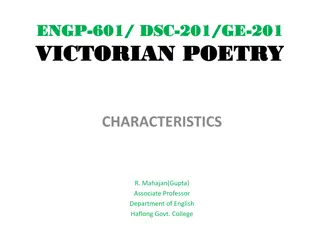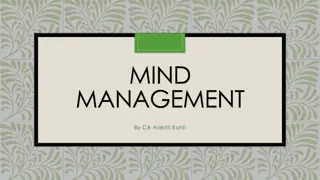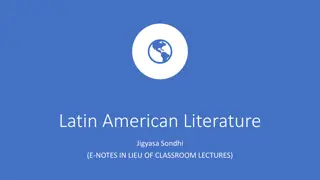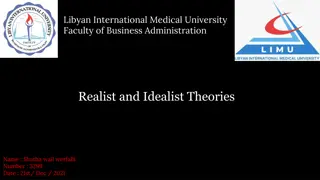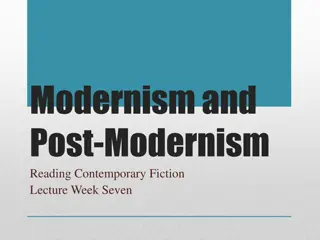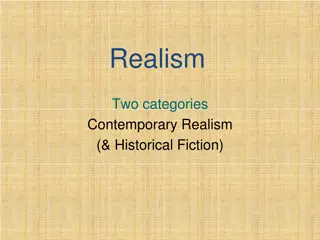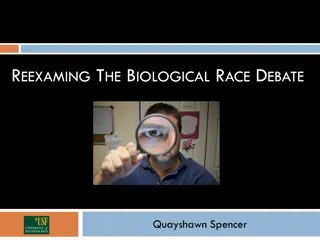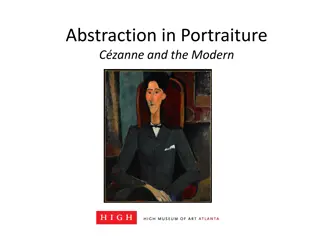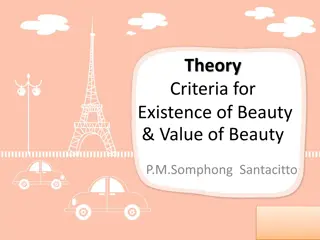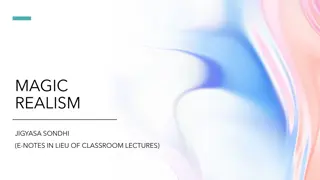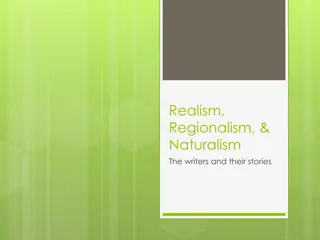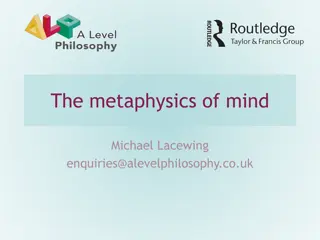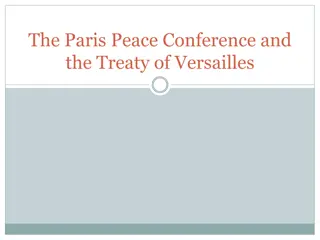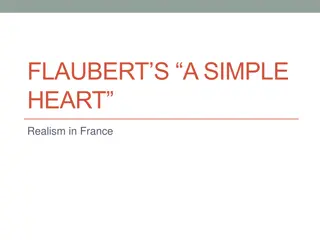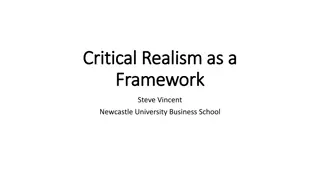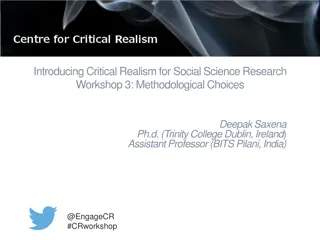Realism and Idealism, Mind and World
These lectures delve into the concepts of realism and idealism, exploring the nature of the world as independent of thought or representation, and the contrasting view that the world somehow depends on thought or representation. Michael Morris defends a robust form of realism, critiquing idealism and reflecting on his past perspectives.
Download Presentation

Please find below an Image/Link to download the presentation.
The content on the website is provided AS IS for your information and personal use only. It may not be sold, licensed, or shared on other websites without obtaining consent from the author.If you encounter any issues during the download, it is possible that the publisher has removed the file from their server.
You are allowed to download the files provided on this website for personal or commercial use, subject to the condition that they are used lawfully. All files are the property of their respective owners.
The content on the website is provided AS IS for your information and personal use only. It may not be sold, licensed, or shared on other websites without obtaining consent from the author.
E N D
Presentation Transcript
Realism and Idealism, Mind and World MICHAEL MORRIS
Realism These lectures are about realism and the relation between the world and our representations of it. Here s what I mean by realism it s the view that (R) The nature of the world as it is in itself is altogether independent of all thought about it or representation of it.
Two key terms The world: whatever is on the other end of intentional relations where there is the possibility of knowledge; what we perceive; what we have knowledge about (when we do); what we are often ignorant about. As it is in itself: the world as it is in itself is just the world as it is as independently of thought or representation as possible. I give it a relative sense, to allow an idealist to characterize their position. This is a stipulation.
Idealism I take idealism to be a kind of contrary of realism it s the view that (I) The nature of the world as it is in itself somehow depends on thought or representation.
My own view I want to defend a robust form of realism. One motive is that the kind of dependence needed for idealism is hard to make sense of. Another is that we seem to be committed to some form of realism in everything we do, and it s nice to be consistent.
My past I have not always thought this. In 1992 (The Good and the True, p. 16) I committed myself in print to this view: The nature of the objects, properties, and facts to which our concepts correspond is not fixed independently of the concepts which correspond to them. I now think this is wrong. I think the source of the error is that idea of correspondence. That s the thought which underlies all these lectures: I m looking for a kind of realism without correspondence.
Plan for these lectures In this lecture I ll look at the main argument of John McDowell s Mind and World. This argument is ostensibly about the relation between conceptual thought and the world: McDowell s argument commits him to the view that the world is conceptual. I ll argue that this is unacceptably idealist. In the second lecture, I ll argue that in fact the only thing McDowell s argument can be about is the relation between language and the world, rather than that between thought and the world. In the third lecture, I ll locate that view of language in a larger tradition, which includes the early Wittgenstein and many figures in the history of philosophy. I ll argue that this too looks unacceptably idealist. In the fourth lecture, I ll turn aside to look at the apparently odd view of artistic images presented by Plato in the Republic and the Sophist. And in the fifth lecture, I ll try to use this to suggest a different way in which representational systems, including language, might be related to the world.
McDowells Kantian background McDowell is concerned with the question of the mind s relation to the world. He aims to explain and defend the Kantian slogan Thoughts without content are empty, intuitions without concepts are blind (CPR, A51/B75).
Two key features of these terms - (i) Their position in the relation between the mind and the world. Roughly speaking, intuitions are associated with sensory input, whereas concepts and thoughts are concerned with the organization and treatment of that input;
And ... Their relation to freedom and reason. Intuitions are concerned with what is given to us, in receptivity (the mind takes stuff in, without choice), whereas concepts are spontaneous (that is, freely applied). Moreover, precisely because of its association with freedom, the faculty which deploys concepts can be said to be concerned with reason, which has no place in pure receptivity. (ii) McDowell is concerned to explain the relation between what affects our senses without our choosing, on the one hand, and the way in which we freely organize that and reason about the world, on the other.
McDowells see-saw: The Given Here is a tempting argument: (G1)Unless there is some constraint on the conceptual from outside the conceptual, the conceptual (which includes all judgement) is unconstrained; (G2) The conceptual cannot be unconstrained; so (G3)There must be some constraint on the conceptual from outside the conceptual. Constraint here must be justificatory constraint: something which provides a reason for judgement.
McDowells formulation of the Given Accepting that understanding of constraint ,(G3) can be reformulated like this: (G3a) What is outside the conceptual must provide reasons for what is conceptual. Or, in McDowell s formulation: (G3b) The space of reasons is made out to be more extensive than the space of concepts (MW,6). That is the idea of the Given: the Given, on this view, is something outside the conceptual which justifies the conceptual.
McDowells objection to the Given According to McDowell the Given can t do the job. The argument is this: But we cannot really understand the relations in virtue of which a judgement is warranted except as relations within the space of concepts: relations such as implication or probabilification. (MW, 7) In effect, the idea of the Given offers exculpations where we wanted justifications. (MW, 8)
The other side of the see-saw: Coherentism We now have an argument in the other direction: (C1)Unless there is some constraint on the conceptual from outside the conceptual, the conceptual (which includes all judgement) is unconstrained; (C2)There cannot be any constraint on the conceptual from outside the conceptual; so (C3)The conceptual is unconstrained.
The formal position The (G) argument has this form: (1) p q (2) q _______________ (3) p (i.e., p) The (C) argument has this form: (1) p q (2) p _______________ (3) q
McDowells position McDowell thinks (with the coherentists) that (C2) is true. And he thinks (with the upholders of the Myth of the Given ) that (G2) is true: We need to conceive this expansive spontaneity as subject to control from outside our thinking, on pain of representing the operations of spontaneity as a frictionless spinning in a void. (MW, 11) So he has to deny (G1) (= (C1)).
McDowells solution McDowell s solution is that judgement is constrained from outside judgement by experience. So here we have some sense in which the conceptual is constrained (i.e., (G2)). But he claims experience is not outside the conceptual, so constraint by experience does not violate (C2). The idea is that experience is passive (i.e., receptive ), but conceptual: [W]hen we enjoy experience conceptual capacities are drawn on in receptivity, not exercised on some supposedly prior deliverances of receptivity. (MW, 10)
McDowell on the world McDowell s principal focus is on the relation between judgement and experience, but experience only enters the picture because it is the link between our minds and the world. In a particular experience in which one is not misled, what one takes in is that things are thus and so. That things are thus and so is the content of the experience, and it can also be the content of a judgement So it is conceptual content. But that things are thus and so is also, if one is not misled, an aspect of the layout of the world: it is how things are. (MW, 26) That things are thus and so is the conceptual content of an experience, but if the subject of the experience is not misled, that very same thing, that things are thus and so, is also a perceptible fact, an aspect of the perceptible world. (MW, 26) So the world is conceptual.
What is it for the world to be conceptual? Two things, I think: (WC1) The world is made up of conceptions of things [T]here is no ontological gap between the sort of thing one can mean, or generally the sort of thing one can think, and the sort of thing that can be the case. (MW, 27) (WC2) The world has something like a syntax: it must be conceptually organized, and so articulable (MW, 6)
The problem with (WC1) It is not credible that something made up of conceptions of things (made up of the sort of thing one can think) could be final source of the justification of our judgements, and hence our anchor in the world. In effect, this can t be the world as it is in itself. The world as it is in itself has to be what conceptions are of.
The problem with (WC2) The difficulty is that the world s having something like a syntax is not even intelligible except as a projection from what McDowell calls the conceptual: it cannot be understood except in terms of its relation to the conceptual. Moreover, the relation in question in effect being such as to justify judgement in a particular way seems to impose epistemic constraints on the world. This looks like a form of idealism.
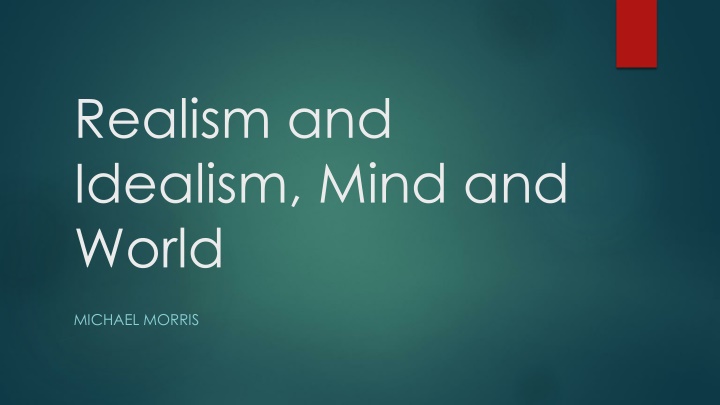

![[PDF⚡READ❤ONLINE] Zen Mind, Beginner's Mind: 50th Anniversary Edition](/thumb/20459/pdf-read-online-zen-mind-beginner-s-mind-50th-anniversary-edition.jpg)

